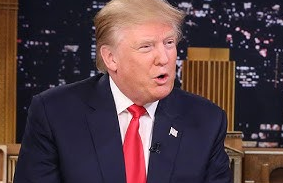The political resurrection of President-elect Donald Trump has triggered significant tremors within the Democratic Party and sent Hollywood into a state of uncertainty. Late-night television, once a powerhouse in influencing cultural conversations, finds itself notably impacted by Trump’s re-emergence on the political scene. Popular shows hosted by Stephen Colbert, Jimmy Kimmel, and Jimmy Fallon are grappling with declining ratings, indicating a marked loss in the cultural significance they traditionally held.
Recent research conducted by the Media Research Center during the peak of the 2024 election cycle reveals that late-night comedians concentrated predominantly on lampooning Trump. From September 3 to October 25, these programs delivered approximately 1,463 jokes concerning Trump and Kamala Harris, with a staggering 98% aimed at the former president. Vice presidential candidate JD Vance, meanwhile, was the target of 78% of running mate-related humor.
This relentless mockery of Trump appears to have struck a chord with viewers, as evidenced by significant drops in viewership numbers. Analysts suggest that this trend may reflect what some are dubbing “Trump Derangement Syndrome,” where the heavy focus on anti-Trump humor has not resonated with the typical audience. As a result, many fans are tuning out, leaving once-dominant late-night shows scrambling to retain their audiences.
The Democratic Party’s post-election turmoil further complicates the situation. In the absence of a strong leader and clear direction, the party's struggles parallel the challenges encountered by Hollywood's elite figures. Prominent celebrities like Alec Baldwin and Cher, who pledged to relocate to Canada in the event of a Trump victory, have yet to follow through with their intentions, adding a layer of irony to the narrative.
The decline in late-night television ratings signals an overarching cultural transformation. With Trump back on the political stage, the media and entertainment landscape continues to shift. In order to regain traction in a divided media climate, late-night comedy may be compelled to recalibrate its approach, moving away from divisive themes and seeking broader appeal to a more varied audience.





















